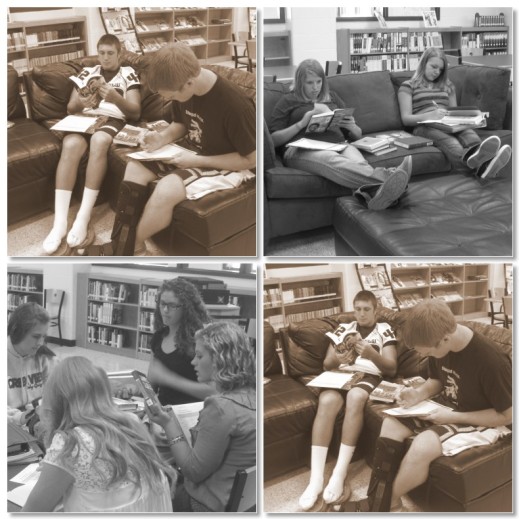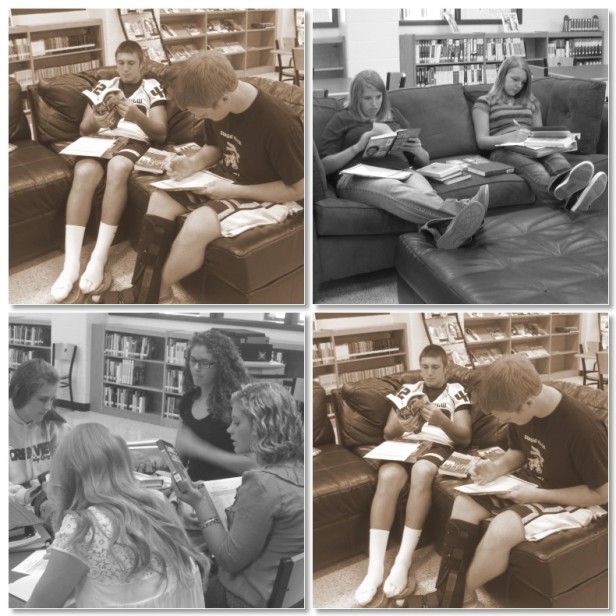By popular demand, I’d like to flesh out the details of an activity I’ve done in the past that I call “book tasting.” I’m sure I am not the first to do it, but the term seems to be that appeals to our teens! Here is how today’s book tasting played out with Susan Lester’s 10th Honors World Literature/Composition students who are also our third cohort of “Media 21.”
Susan and I have worked together in past years to develop a collection of book sets (fiction and nonfiction) on issues related to countries and/or regions in Africa including the HIV epidemic, ethnic wars and genocide, famine, environmental issues, women’s rights, apartheid, and children soldiers. We’ve expanded the offerings for this fall to include other contemporary titles related to these issues in other regions of the world as well as immigrant rights, poverty, human trafficking, and privacy issues in a post 9/11 world.
 We placed the books on carts that were ready for students when they arrived in the library today. I explained to the students that we were going to use today’s class period and tomorrow’s to “taste” and immerse ourselves in the books by selecting at least five books over the two day period and to take time to read 10-15 minutes for each book. Students were encouraged not only to select any five books of their choosing from the carts, but we also offered the option of nominating any additional selections they might choose using our OPAC, NoveList, or Amazon as a discovery portals for additional book choices. Students are using the form below to record choices, notes, and evaluating how “read-worthy” the book might be with 1 being “Ugh, I can’t get into this book” to 5 being, “I could really sink my teeth into this text.”
We placed the books on carts that were ready for students when they arrived in the library today. I explained to the students that we were going to use today’s class period and tomorrow’s to “taste” and immerse ourselves in the books by selecting at least five books over the two day period and to take time to read 10-15 minutes for each book. Students were encouraged not only to select any five books of their choosing from the carts, but we also offered the option of nominating any additional selections they might choose using our OPAC, NoveList, or Amazon as a discovery portals for additional book choices. Students are using the form below to record choices, notes, and evaluating how “read-worthy” the book might be with 1 being “Ugh, I can’t get into this book” to 5 being, “I could really sink my teeth into this text.”
Students have the option of sampling more than five books if so inclined. Once they finish their book tasting on Friday and complete their final evaluations, Susan and I will take a look at their forms and group students in literature and inquiry circles in one of the following ways:
- Groups may be formed around a common reading
- Groups may be formed around a common theme or issue. Groups formed around a common theme or issue may all be reading the same book, or each member could be reading a completely different text but still be unified by the threads of a common theme/issue. A group could also be doing mixed readings in the sense that half the group is reading one text, and the other half has a different selection.
Once groups are formed, we’ll spend about two weeks immersed in our texts. I’ll elaborate more in future blog posts, but we’ll be using collaborative reading responses by group, Fishbowl discussions, and individual responses to the texts to scaffold conversations for learning and as the fodder to help students formulate their research topics and inquiry questions for a digital research composition in October (again–more details coming soon on these learning activities, assessments, and objectives). Our hope is that this learning structure will give students a more organic series of learning experiences that provides them more freedom, ownership, and participation in the unit of study.
Susan and I are excited to restructure the book tasting in this format; in the past, we had a Publisher template I created that looked like a menu, and we actually required students to sample every book from our menu. We really wanted to open that up this year to allow more choice, and the students seemed much more engaged with the texts they were sampling today. We can’t wait to see how it evolves tomorrow and to begin our journey of learning with this unit of inquiry!


Thanks for sharing your experiences with book tasting!
I tried this with fiction last year for our S1 pupils (the equivalent of 6th/7th grade in Scotland). Teachers and I had been struggling with reluctant readers and a number of pupils who claimed they “didn’t like books,” so I decided to give book tasting (or reading sampler sessions as we called them) a try.
My colleagues were amazed by the difference in pupils’ reactions to the sampler sessions, as opposed to the more straightforward library visits the pupils had made before the school had a qualified librarian. The pupils were actually arguing (lightheartedly, of course) over who got to read which book next. Their enthusiasm was so infectious that even the most reluctant readers got caught up in the excitement.
Book tasting is definitely a great way to reach kids who claim not to like reading, and a way to challenge regular readers to read more widely. Plus, it doesn’t need to be confined to the library. Our library was absolutely tiny and could only accommodate one class at a time, so I would load up a couple of boxes with books to take to classrooms in order to meet demand.
Good luck with it! I’m very interested to read more about your literature and inquiry circles.
-Erin
LikeLike
That really does seem like a very positive way to promote reading. Great work!
LikeLike
This is an awesome idea but I am wondering why limit it to students? Why couldn’t the public library offer this program for adult readers, reluctant or otherwise? It seems like a great way to learn a little about a lot of things in a relatively short period of time. Then one could continue to learn more about any one topic that interests them. Or if literacy is an issue maybe this idea could be tweaked to assist with that? I am a librarian that works for an ILS vendor so I am not aware of the day to day realities of life in a library, in any great detail. It just seems to me that this is a brilliant idea that could have more applications then just one.
LikeLike
I totally agree this learning experience could be offered in any library setting! I’d love to hear of any academic or public libraries who are doing something similar.
Best,
Buffy
LikeLike
I love the idea of adapting this for Special Collections as a way to put together a selection of materials united by a loose theme, and get them out of the closed stacks, seen, and used. Hmm…so many ideas…
LikeLike
Thank you for sharing this awesome idea! I think this is a great way to get students using the resources in the library aside from just the internet. I like the fun name you have given it, as it allows for students to dive into research without the feeling of having to commit and read the whole book. This could also be a fun way to help students choose books for pleasure reading too.
“Our hope is that this learning structure will give students a more organic series of learning experiences that provides them more freedom, ownership, and participation in the unit of study.” This idea is definitely important with the large curriculum changes in British Columbia, where we want learning to be a more organic process where students feel they are interested and have some choice in what they are learning.
I feel this could also be great way to share resources with staff as well? Has anyone tried this?
Looking forward to hearing more about how this project continues!
-Emma
LikeLike